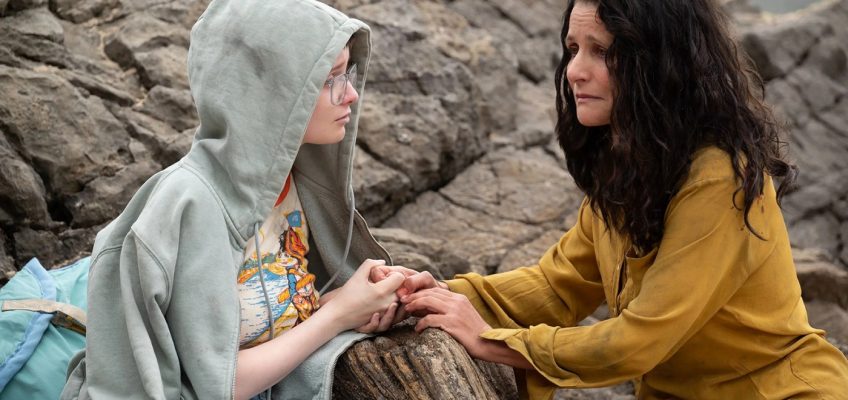Those of us movie critics fortunate enough to be in this line of work are always trying to squeeze another two hours or so out of the week to catch one more new film. Because you never know. Which is to say: I’m extremely happy to have seen “Tuesday,” which demands and receives new and challenging things from Julia Louis-Dreyfus while announcing a formidable new filmmaker, the Croatian writer-director Daina O. Pusić. She has created an imperfect but singular fairy tale for adults, but not just adults, really. There’s real magic and deep feeling behind it.
Allow me to describe it deceptively. “Tuesday” is the name of the 15-year-old girl using a wheelchair, hooked up to IVs, in the care of a home nurse while the girl’s mother works. Even when she’s not working, the mother, Zora, played by Louis-Dreyfus, doesn’t spend much meaningful time with her girl. Tuesday is dying. Zora isn’t coping well. Grief has a way of arriving before a loved one dies, and Zora’s grief has thrown her into a nervous whirlwind of busyness and chatter.
Now for the fantastical aspect of “Tuesday.” The first character we meet in Pusić’s story is a macaw, in fact a Macaw of Death. (The bird, which can radically size-shift from teeny-tiny to halfway-to-Kong size, is billed in the credits simply as “Death.”) With a brief, calm wave of its wing, Death brings the end to humans whose laments Death has heard, and will heed. This grubby but remarkable bird, badly in need of a bath and some peace, has a difficult time tuning out Earth’s perpetual chorus of lamentation.
Now it’s Tuesday’s time, her breathing having grown increasingly labored. The macaw arrives in Zora’s London townhouse at the appropriate time. (Death can speak, by the way; Nigerian born actor Arinzé Kene provides the unearthly-deep but surprisingly companionable voice characterization.)
For a time, Tuesday and Death find solace in each other’s temporary company. Shrinking down, the macaw enjoys a badly needed bath in Tuesday’s bathroom sink. Tuesday plays one of her favorite songs, Ice Cube’s “It Was a Good Day,” which turns out to be a favorite of Death’s, too. They get high, in a scene not played for the kind of laugh you might expect, even from an off-center, A24-distributed picture.
Early on we see Zora bartering with a taxidermist, trying to sell a couple of stuffed rats, so we know money is tight for this woman, because dying is expensive. “Tuesday” phases into a darker, wilder hue once Zora meets the macaw, and does everything she can — including swallowing the bird whole! — to prolong her daughter’s life a bit longer, even if Zora hasn’t yet used the time they have especially wisely. Meantime an apocalypse, glimpsed in a few brief images, rages all over London, and presumably elsewhere.
Related Articles
She’s 94 years old. But June Squibb is scooter-driving action hero in ‘Thelma’
‘Fancy Dance’ director Erica Tremblay talks about creating complex Native stories
Talking to Kevin Costner about ‘Horizon’: He’s bet everything, will it pay off?
‘Purple Rain’ at 40: Here are all the ways to celebrate Prince’s once-in-a-lifetime masterpiece
‘The Hangover’ at 15: Here are 15 things you may not know about the comedy
The movie scatters and, here and there, stumbles a bit in its second half. And yet the spell never broke for me. The everyday heartbreak, such as Louis-Dreyfus’s startled, shaken non-verbal reaction to the taxidermist’s casual question about the age of her daughter, makes “Tuesday” a very full experience. Louis-Dreyfus is wonderful in this, ready for anything, never soft-pedaling her character’s flaws or panic or fear. Lola Petticrew makes Tuesday both compelling and admirable in her directness. As Tuesday’s caregiver, Leah Harvey is equally fine.
None of their work would be half as effective without the marvelously matter-of-fact digital realization of Death, thanks to visual effects supervisors Mike Stillwell and Andrew Simmonds. There scarcely a moment in “Tuesday” wasted on a shock cut or a jump scare or anything at odds with the atmosphere of quiet astonishment. Sound designer Gunnar Óskarsson’s avian shudders and human lamentations fill the soundtrack when needed, but sparingly. And when Death speaks, we see and hear the hesitancy, even if it’s something as simple as his appreciation of sarcasm. (Jesus was really into it, he notes.) This is, after all, a creature that hasn’t spoken in roughly 200 years.
Magical talking birds have flown in and out of plenty of timeworn fairy tales and folktales, from Gozzi’s play “The Green Bird” to Sicilian folklore and beyond. This one’s really something. I can’t wait to see what this filmmaker does next. Same with Louis-Dreyfus, although “Tuesday” reminds us she can do just about anything.
“Tuesday” — 3.5 stars (out of 4)
MPA rating: R (for language)
Running time: 1:51
How to watch: Premieres in theaters June 14
Michael Phillips is a Tribune critic.


Leave a Reply